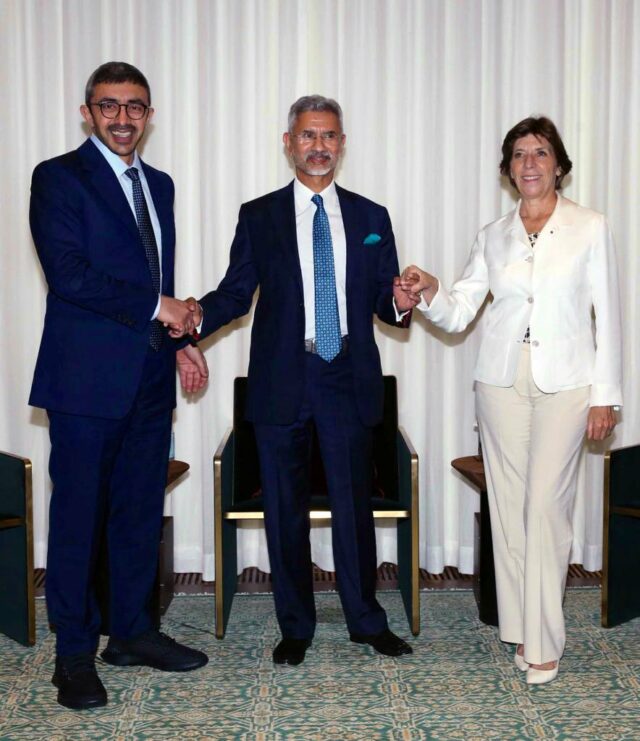Welcome to the Trilateral or to give it its full due, Trilateral Cooperation Initiative, the latest in the web of minilaterals trending in the region. The Trilateral brings together India with the UAE and France to work on climate change, solar and nuclear energy with External Affairs Minister S Jaishankar emphasising “building practical projects that will benefit the region.”
Look a little deeper and you get a sense of where this is going. Jaishankar said the aim was to build “a stable, peaceful and prosperous Indo-Pacific.” The Trilateral joint statement issued over the weekend also underscored efforts “to further promote compatibility and joint development and co-production whilst seeking out avenues for further collaboration and training between the three countries’ defence forces.”
For many in New Delhi’s diplomatic circles, the formal announcement of the trilateral conveys strong signals to the rest of the world. India’s aims in the Gulf and the Western Indian Ocean region can be better realised with like-minded partners who share similar goals. While India shares strong defence ties with the US, the responsibility of the Indo-Pacific Command ends at the western coast of India, while the western Indian ocean comes under the Central Command, which has hardly any links with the Indian Navy. What this has meant is that India’s crucial strategic and security interests in the Gulf, at various chokepoints along the Red Sea, and along the Horn of Africa, have not adequately been met. It is here that the trilateral with France and the UAE matters.
“France has a long-standing military presence in the Western Indian Ocean (WIO) with a base at Djibouti and a naval base at Abu Dhabi. The significance of the French presence is that it is located at the chokepoint of the Bab-el Mandeb while at Abu Dhabi it is located at the Strait of Hormuz. This is of enormous strategic significance for India.” says Talmiz Ahmad, former diplomat and ambassador to the UAE. “As far as the UAE is concerned, it has expanded across the region and now controls the Yemen coastline along with Perim and Socotra Islands. Perim is located in the centre of Bab-el-Mandeb while Socotra is located between the Red Sea, Gulf of Aden and east Africa.”
“The control of these islands is something India and France would not have been able to obtain without strong backlash given that they are not regional players. So, involving the UAE is crucial to securing our interests here,” he says.
The other impetus for the Trilateral is the uncertainty of the US role and commitment to West Asia. While the US still has an estimated 70,000 troops in the region along with the Al-Udeid air base, home to the Central Command, questions are now being raised about their role given Washington’s perceived lack of interest. While the US seems committed to containing Iran, it seems indifferent to the Saudi-Iran rivalry, the situation in Syria and Libya, the Tigray conflict in Ethiopia, Turkey’s problems with its neighbours, and the rising dangers of an Iran-Israel conflict as Iran sends its warships into the Red Sea.
These flashpoints are growing more dangerous by the day and analysts argue that there could be a role for the Trilateral in helping to resolve tensions, which in turn could provide India with a stronger voice and role in the region.
The Trilateral can also become a force in East Africa where Russia and China have made significant inroads. It could leverage its influence through capacity building and other initiatives especially in the strategically important states of Mozambique, Kenya, Madagascar and Seychelles.
There are a number of ways in which these three countries could work together. The UAE’s “string of ports” strategy whereby it invests in underdeveloped and less strategic ports along the Red Sea in conjunction with India’s port development expertise, can set the tone for joint port-development projects in third countries. Monitoring, preventing and countering Islamic extremism in Kenya, Mozambique and Comoros and Mauritius islands in the Western Indian Ocean is also a shared concern and ways and means will surely be discussed between the three nations on how to jointly tackle the problem. But don’t expect everything to fall into place immediately.
“A working trilateral is a new experience for all these countries and all of them need to understand each other’s strategic concerns well enough to accommodate them so that we can move in the same direction,” said a senior diplomat, adding that “This will take time. Attitudes too need to be changed. Previously, countries have complained that India makes all the right noises but does not come through on the follow-up. We will need to work hard to ensure that such concerns do not arise again.”
The Trilateral Initiative also sends an important message to the neighbourhood. As former Deputy NSA Pankaj Saran pointed out, “The trilateral has enormous symbolic significance as it sends a strong message to Pakistan. The fact that the UAE got involved with India in the I2U2 quadrilateral and now once again in this trilateral suggests Pakistan is losing its leverage over the UAE. This can only be good news for India.”
















